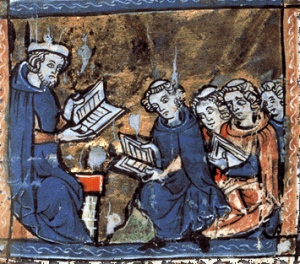James K.A. Smith over at Comment, has an interesting—and curmudgeonly—essay praising newspapers and asking what the purpose of education is. Read the whole thing, but here is an excerpt:
It’s easy to take for granted one of the remarkable accomplishments of Western democracy: the availability of free, universal, public education. Once the luxury of a privileged elite, now a fundamental education in the arts and sciences is available to all. Despite its problems and deficiencies, a wide-angle view of history can only cause us to marvel at the realization of what was a dream for our forebears. And many go on to postsecondary education as well: over 65 percent of high school seniors in the United States go on to college; and about 65 percent of Canadians have a postsecondary education. In the long arc of history, we in North America are the privileged 1 percent of educated elites.
Given this remarkable cultural accomplishment, permit me one curmudgeonly observation. It’s hard for me to imagine that our forebears dreamed of universal education so that we could spend hours upon hours glued to screens playing Words with Friends or trying to slice digital fruit like a ninja. And yet, as someone who spends countless hours on airplanes, I never cease to be amazed at the number of professional, college-educated adults who, when presented with a three-hour stretch of downtime, proceed to spend that time playing video games. Our countries invest 5 percent of their GDPs in universal education; teachers invite us into the labyrinths of history and the imaginative worlds of literature; parents make sacrifices for us to attend Christian schools and colleges. And we play Angry Birds. We’re not educated for this, surely.
A flight or a train ride or even a doctor’s waiting room is a little gift from a God who delights in the liberal arts—a tiny sabbatical from the drudgery and distraction of our workaday existence in which we can continue our educations and cultivate the intellect. Think of a plane ticket to Vancouver or Los Angeles as the opportunity to finally pick up The Brothers Karamazov or read Shelby Foote’s history of the Civil War or tackle Bavinck’s Dogmatics. Or at least resist the People magazine and catch up on issues of the Walrus, the New York Review of Books, and National Affairs. Don’t waste your education.
I told my students recently, just before graduation: If I ever see you on a plane playing a video game, I will accost you, and I will be disappointed, and I willforthrightly remind you: you weren’t educated for this. The world needs your (continuing) education, and your soul is starving for it. We are remarkably well-educated dwarfs standing on the shoulders of giants who could only dream of what we enjoy. Let’s not squander our inheritance.
 I recently came across a slender book that aims to redesign liberal education using digital technologies. Titled Open and Integrative: Designing Liberal Education for the New Digital Ecosystem, it certainly tackles an important question: how should liberal arts colleges use new technologies to fulfill their traditional mission? Unfortunately, the book is riddled with the jargon and assumptions of tech boosterism; it’s full of the kind of prose that only makes sense within the echo chambers of technology trade shows.
I recently came across a slender book that aims to redesign liberal education using digital technologies. Titled Open and Integrative: Designing Liberal Education for the New Digital Ecosystem, it certainly tackles an important question: how should liberal arts colleges use new technologies to fulfill their traditional mission? Unfortunately, the book is riddled with the jargon and assumptions of tech boosterism; it’s full of the kind of prose that only makes sense within the echo chambers of technology trade shows.

